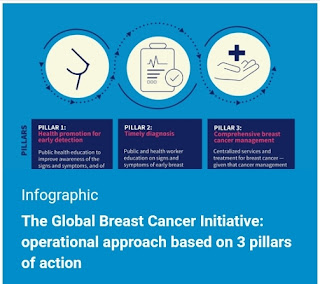Section navigation
Breast cancer—the most common cancer worldwide and leading cause of cancer death among women—disproportionately affects individuals in low- and middle-income countries. Breast cancer five-year survival rates in high-income countries exceed 90%, compared with 66% in India and 40% in South Africa.
Bridging inequities in breast cancer outcomes requires systematic improvements in access to resource-appropriate and quality services. The World Health Organization’s Global Breast Cancer Initiative (GBCI), established in 2021, brings together stakeholders from around the world and across sectors with the shared goal of reducing breast cancer by 2.5 percent per year, which over a 20 year period would save 2.5 million lives.
GBCI employs three key strategies to achieve these objectives: health promotion and early detection; timely diagnosis; and comprehensive breast cancer management.
Through GBCI, WHO provides guidance to governments across the world on ways to strengthen systems for detecting, diagnosing and treating breast cancer, to further their capacities to manage other types of cancer.- WHO










0 comments:
Post a Comment